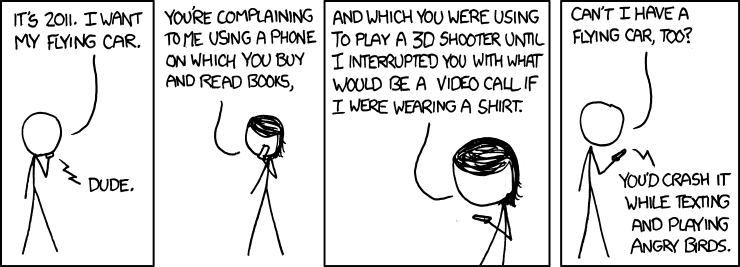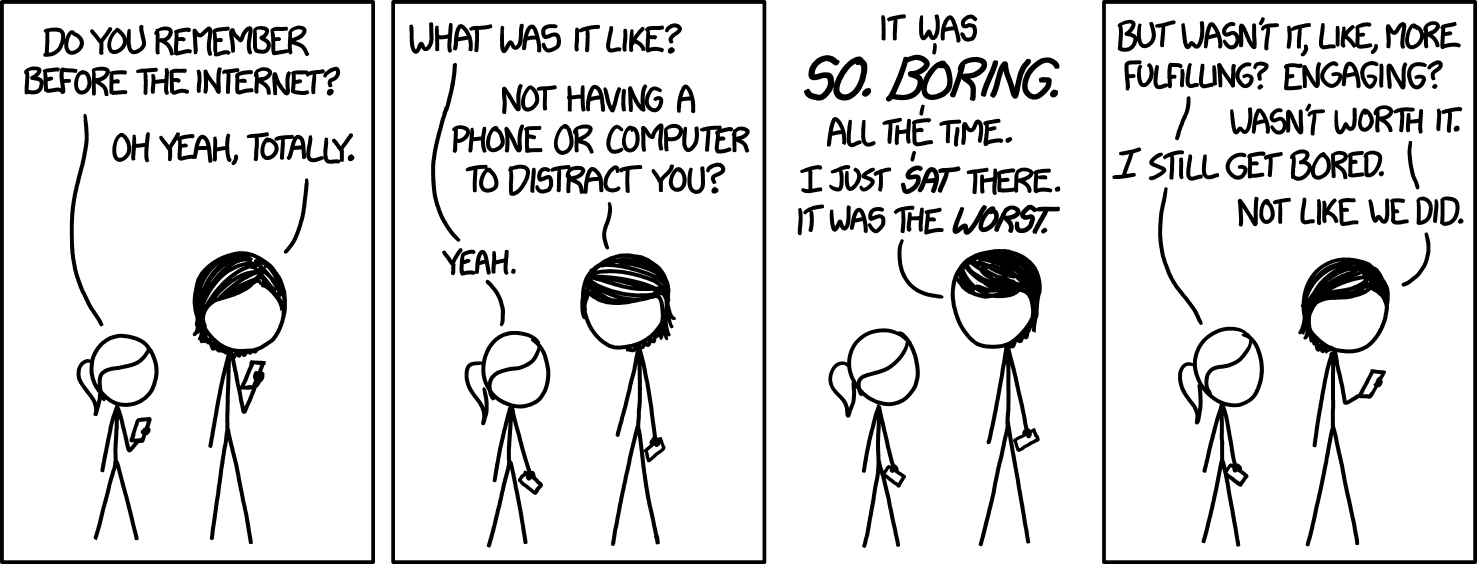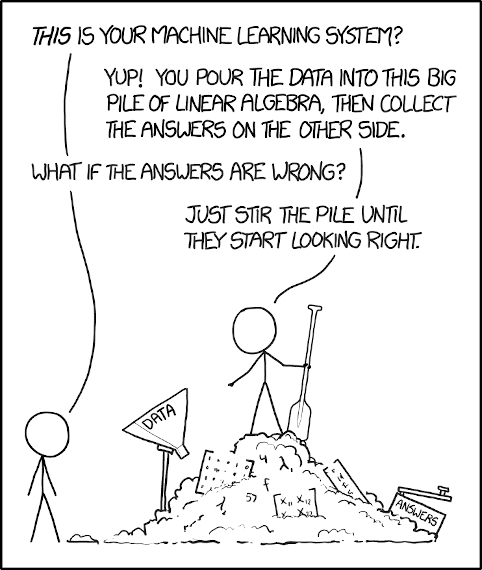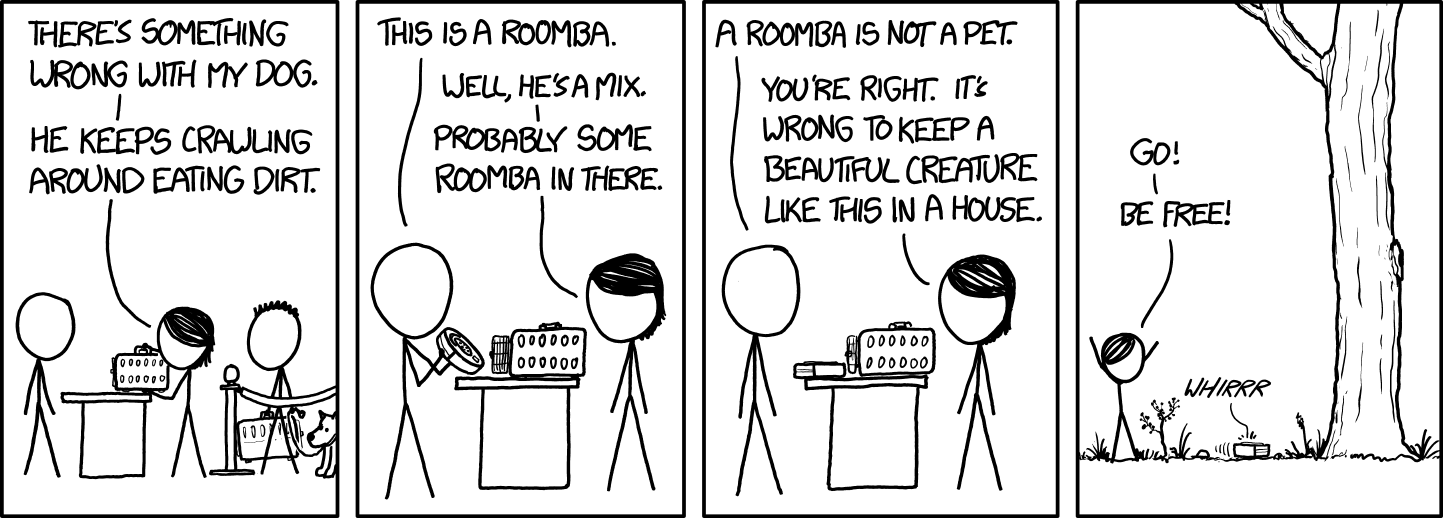Why Robots? Deciding What I Want To Do With My Life
Ever since my parents bought me my first robotic toy as a kid, I’ve been excited about robots. Over the years, I’ve been lucky enough to have had numerous opportunities to work with robots. I’ve played with toys, spent multiple years building Lego and heavy-metal robots for competitions, and most-recently done research with robots. So, when it came time for me to seriously consider what I want to do with the rest of my life, ‘work with robots’ was the first and natural choice.
A while ago, a friend asked me a simple question: ‘why robots?’. I was quite surprised that this was a question at all: there are so many obvious answers. The more relevant question should’ve been ‘why not robots?’. When my friend pointed out that that wasn’t a sufficient answer, I realized I hadn’t really thought through all my reasons for wanting to work with robots. I’m a big believer in carefully and consciously reasoning from first principles when it comes to major life decisions, so it was quite alarming that I didn’t have a satisfactory answer to the simple question of ‘why robots?’.
I spent a long while thinking about my answer to this fundamental question and fortunately came up with one that I find quite satisfactory. This essay is an attempt to capture and record that answer.
So, why robots you ask?
The Greatest Tool Ever Invented
A couple millennia ago, Homo Sapiens’ lives were quite difficult indeed. The primary concern was food: most Sapiens got hungry at least once every day, and the only solution was to find and consume food. Unfortunately, food didn’t just show up at a centralized location, it usually needed to be hunted. Sapiens needed to chase and kill animals that – to our ancestors’ great annoyance – didn’t want to be killed and eaten. To make existence more annoying, some animals wanted to chase and kill the Sapiens. This presented a difficult existential dilemma: the Sapiens needed to get food without becoming food themselves. This was quite a problem indeed because many of the animals were bigger, stronger and deadlier than the Sapiens.
However, the Sapiens made an important discovery. They realized that these ubiquitous things we call rocks were quite hard. This was a useful property, because the rocks could be used to inflict injuries. However, it was difficult to completely kill an animal with the rocks. At some point, a couple Sapiens realized they could sharpen rocks. They fashioned the first crude axes and spears. Suddenly, hunting and protecting themselves became much easier. Suddenly, they moved to the top of the food chain.
Our ancestors’ discovery and use of rocks might seem trivial or irrelevant, but it is arguably one of the most significant events in human history. Those rocks were our first tools. The discovery and use of tools is considered a unique sign of intelligence. In fact, it is this ability to create tools that’s enabled modern life. From crude spears and axes, we moved on to fire, then clothing, then bricks for construction, then metalworking, then the wheel, then eventually the printing press and later the steam engine, then the electric motor and generator, then the telephone and the electric light bulb, then the transistor which paved the way for the computer and more recently, the Internet. The entire field of technology, the reason that our species expanded from a few scattered tribes to occupy every continent with 8 billion total individuals, is essentially an exercise in understanding the laws of the natural world and using these laws to build tools that will help us exploit it.

And intelligent robots might just be the greatest tool we’ve ever invented.
Like previous world-changing tools, robots have an unprecedented potential to enable. Human bodies have significant limitations: we cannot survive radiation or extreme temperatures and are quite easily injured. With robots, we could spend years constructing extraterrestrial habitats before the first humans would arrive to settle them, we could operate nuclear power stations with an unprecedented level of safety, and we could enable the physically-disabled to do almost any task a normal person could do. Humans are prone to making avoidable mistakes. Robots are much less prone to failure in previously-seen environments, and they could enable us to save lives in medical diagnosis and routine surgery. Humans can’t thrive with a prolonged lack of food, water or sleep and do not enjoy performing repetitive drudgery. Robots could perform drudgery round-the-clock with minimal power and thus enable us to produce and distribute enough resources for every human on Earth to survive and thrive.
Intelligent robots have a seemingly endless number of applications. However, the most transformative applications might be those that are impossible to fathom today. When pioneers like Charles Babbage, Alan Turing and John von Neumann first conceived of computers, they did it for what would seem like an incredibly niche use. They were mostly interested in using computers to quickly solve polynomial equations or compute unwieldy integrals. They probably realized their discoveries would have other uses, but none of them probably ever conceived of digital file storage, video projection, email or the myriad of other things computers have enabled. Similarly, widespread intelligent robots could spawn a myriad of other exciting tools downstream that it’d be impossible to anticipate today.
Robots might just be the next big world-changing tool; the tool that our descendants will look back and wonder how humans lived without. And that prospect excites me to no end.
A Marriage of Bits and Atoms
The computer is currently arguably the greatest tool ever invented. It’s quite awe-inducing to consider just how much computers have impacted our lives in only 50 years since they were invented. Indeed, it’s quite difficult to imagine human life before computers.

While it may seem that computers can solve literally any problem, they do have an important limitation that’s been pointed out to me. Computers operate in a world of bits, but the real world operates on atoms [1]. At their core, computers are information processing machines. And while information is incredibly valuable, it is useless in of itself. The power of information -and by extension the computer – comes when it is used to manipulate the atoms of the physical world. For all their processing power and capabilities, computers cannot directly manipulate atoms, humans must constantly interpret and use computers’ information to affect the world.
Robots seem to be the first significant bridge between the two worlds, the first marriage between bits and atoms.
This may seem like a purely abstract and perhaps insignificant point, but I think it further illustrates just how much of an impact robots could have on us. Robots will be able to both process information and act to reconfigure atoms in the physical world based on this information, much like we ourselves do. They will be able to perceive aspects of the world and thus gather and process an unprecedented amount of data, which could give us much more insight into problems that remain unsolved. They could perform basic tasks that were thought impossible to perform by anything other than a human.
If computers have impacted the world this much in such a short span of time while they were limited to the world of bits, there’s no telling how much impact they could have when they begin manipulating atoms.
A Window into intelligence
‘What is intelligence?’ – this is arguably one of the biggest unanswered questions in human history. We can’t yet provide a precise definition of intelligence and we don’t yet actually understand how it works. Attempting to do so has been one of the largest scientific endeavors of the last century.
We want to answer the intelligence question not only out of curiosity, but also out of utility. Intelligence has probably been humanity’s single greatest asset. Understanding it and being able to replicate intelligent behavior would be incredibly useful to us. The entire field of Artificial Intelligence (AI) is devoted to attempting to answer this question and replicate an intelligence computationally. While we’ve had significant successes so far, it doesn’t seem that a solution is in sight.

I believe that a significant reason for this is that we’ve been attempting to implement intelligence on disembodied computers. Personally, I’m a believer in embodied cognition – the idea that our cognition and our intelligence are significantly shaped by our bodies. If we were simply brains in vats, and did not have any method of perceiving and acting in our environments, I’m fairly certain that we would not be intelligent in the way that we currently are. Of course, this view of embodied cognition has criticisms and strong counter-arguments, but I think most people would agree that attempting to study and implement intelligence algorithms on robots can only help us.
I’m personally very interested in the intelligence question because I think an answer will help us understand who we are fundamentally as human beings. I think an answer could have radical implications for questions ranging from religion to the origin of life. The ability to program or bestow intelligence would be an unprecedented power that could fundamentally transform our lives. I find it incredibly meaningful to contribute to this prospect. Moreover, I think that answering the intelligence question will throw light on a deeper, more fundamental question: ‘What is consciousness?’.
Robots are Really Cool
When I was around 5 years old, my parents bought me the toy that everyone wanted for Christmas. It was called a RoboSapien and it was a small humanoid robot that came with a remote control that allowed you to either execute preprogrammed motions (like dancing) or finely control specific joints (like moving the hand to a specific pose to pick something up). One of my earliest memories is the raw fascination I had with this human-like toy. Here was a thing that looked human like me: it had a face and eyes and all the limbs and joints that I had. However, it couldn’t move or do anything by itself like I could. I began commanding it to do tasks like pick up a small ball and try to climb onto our sofa. I was surprised that when I tried these, I had to sit down and really think through the sequence of actions. I had to think about how much I wanted to move RoboSapien’s arms, or how far he needed to bend down – yet, if I myself were trying any of these tasks, such things would be so intuitive I wouldn’t give them a moment’s thought. I began wondering what it would take to get RoboSapien to do tasks as easily as I could. I was so fascinated that I spent days trying to think through and get RoboSapien to execute tasks.
Whenever I could get RoboSapien to do something new, like pick up a pencil, I felt a pure rush of excitement. Here was a machine – a thing built by humans – that could pick something up or climb over something just like a human could. It felt so incredibly significant that I had just taught a machine something new. I dreamt of teaching RoboSapien to do more, like cook me a pizza or pick up a pencil and do my homework, but alas these remained out of reach. Still, every time I played with my RoboSapien, I felt a unique mixture of excitement and awe at how incredibly cool this little machine was.
Elon Musk has previously stated that one of the reasons he founded SpaceX was because space exploration is really cool (not his exact words). He feels that space has a unique ability to ignite human minds and make millions of people from diverse backgrounds extremely excited for the future. I think that robotics has a similar magnitude of coolness and potential to excite. I think the vision of a future where intelligent machines of multiple forms are a part of our daily lives is fundamentally exciting. And I would cite the popularity of science fiction works such as ‘Iron Man’ or ‘I Robot’ as evidence.
However, regardless of whether a vast majority of humans think robots are cool, I still very much think so. To this day, whenever I work with robots, I still feel like I did when I was a 5-year-old kid playing with his RoboSapien. I’ve not really been able to find another field that gives me such a sense of excitement and awe no matter what I work on within it. Despite the fact that current robots are incredibly complex, unwieldy, difficult-to-program things that will often fail in an incredibly esoteric manner, the prospect of working with robots still gets me out of bed every morning.
I recognize that I’m quite biased when it comes to robots. It’s very possible that robotics could lead to a dead-end. Robots might never realize the potential I’ve talked about. They might never be even semi-intelligent or used outside of large industrial settings. Worse, they could become an active threat to humanity (a la ‘The Terminator’). There’s only one way to find out what’ll become of the field: to try it. I hope to do everything I can to ensure that we develop robots that will be a great enabler of humanity and never a threat. I acknowledge that all my efforts could be futile: whatever work I do could simply never pan out and the entire field could reveal a dead-end. While I hope this won’t happen, even if it does, then at least I’ll have gotten to play with some really cool robots for a while.

A Thought Experiment
I’m a big fan of thought experiments. I think that a really powerful and humbling thought experiment is to imagine one’s own funeral and think about what one would like said for one’s eulogy. I’ve personally spent more time than I’d care to admit engaging in this experiment. I’ve run through hundreds of different eulogies and thought hard about what I’d like people to remember about me and my life. I’ve also run through multiple scenarios of what I could do with my life so that people would say these things and remember me fondly…
One fine day, I had a dream about my funeral. Interestingly enough, the dream had nothing to do with my eulogy, but rather, what my funeral looked like. I saw a vision of a grassy field with a collection of white chairs and multiple people dressed in black. However, what stood out almost immediately were the many non-humans milling about. I saw a couple robots walking around and serving food and refreshments and greeting humans with almost flawless natural language. Another few robots were assisting some elderly people to stand up and walk wherever they pleased. There were also a few young children running around and playing tag with a small, RoboSapien-esque robot.
Of all the funeral scenarios I’ve considered, this is the scenario I like the most.
Footnotes:
[1] I wish I could’ve come up with such a neat, beautiful metaphor, but all credit rightly goes to the amazing Deb Mills-Scofield
[2] All illustration credit here goes to xkcd
Leave a comment